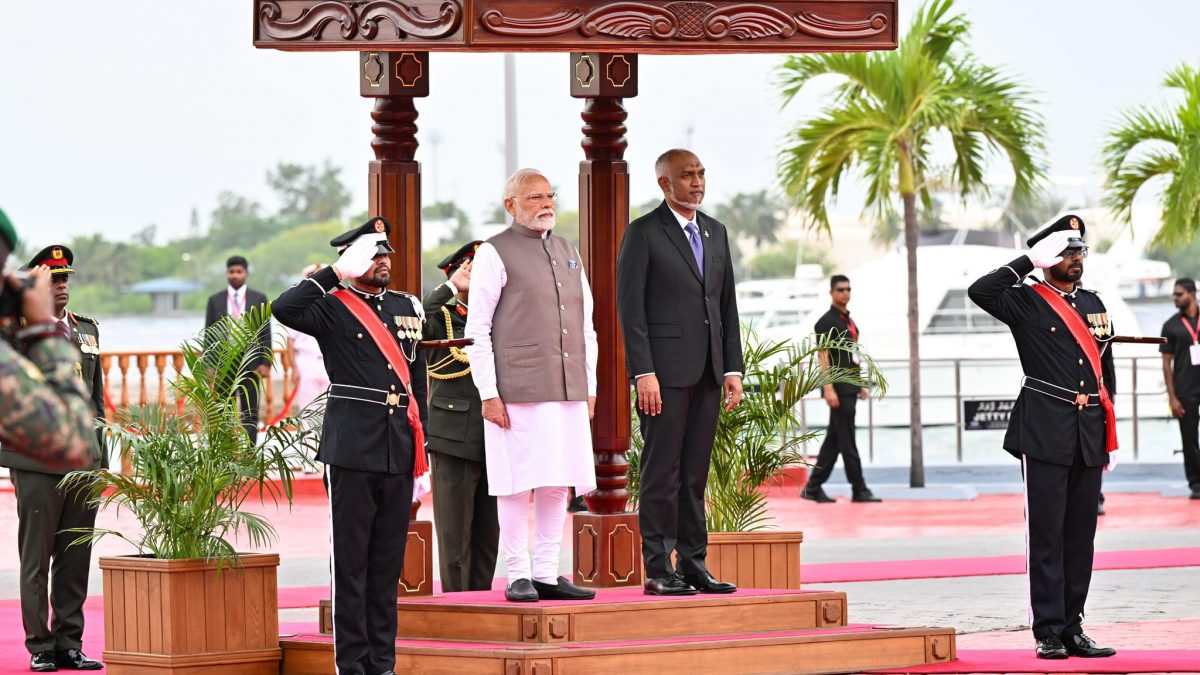In the balmy blue expanse of the Indian Ocean, geography is destiny. Few countries exemplify this axiom better than the Maldives, a string of vulnerable islands perched just 400 kilometres south-west of India.
Prime Minister Narendra Modi’s visit saw its politics swinging from nationalistic bravado to regional pragmatism.
India is a lifeline for the Maldives economically, strategically, and sometimes existentially. Equally, the geographical location of the Maldives is of great strategic interest for India.
The Muizzu administration came to power amid campaign bluster demanding “India Out”—a slogan aimed squarely at the presence of a minor Indian military contingent and Indian involvement in national affairs. For a time, it appeared that Chinese investment and political overtures could fill whatever void India might leave behind. Beijing, keen to expand its Belt and Road footprint, signed infrastructure deals and seemed eager to deliver. But in office, Muizzu has been forced to triangulate. The islands’ routines of dependency have imposed themselves on decision-making.
The core of this dependency is ignored only by the wilfully blind. Take potable water, a resource analysts regretfully call “strategic” in a thirsty archipelago. In 2014, when a fire disabled Malé’s only desalination plant, India, within hours, launched “Operation Neer”, sending drinking water by plane and ship. Other essentials function in a similarly Indian orbit. A big proportion of staples for the Maldivian table—rice, flour, sugar, and vegetables—comes from India. Around 70 per cent of the medicines on Maldivian pharmacy shelves bear Indian labels, a fact underscored by India’s prompt medical assistance during the pandemic’s darkest days. Construction is largely an act of import substitution: cement and steel from the Indian state of Gujarat underpin the Maldives’ celebrated resorts. Even the fuel that powers government facilities and tourism’s infrastructure comes, more often than not, from Indian refiners.
Indian generosity is not purely altruistic; it is part of a carefully calibrated strategy for regional stability. New Delhi’s extension of a $565 million (over ₹5,000 crore) line of credit during Modi’s visit was complemented by the gifting of 100 military vehicles and, most notably, a 40 per cent reduction in Maldivian debt repayments. These gestures appear aimed not only at Malé but also at small Indian Ocean states teetering under China’s loans. India’s message, thinly veiled, is that it remains an engaged neighbour without the “debt trap” tendencies attributed to Beijing.
Impact Shorts
More ShortsUnderpinning this economic largesse is the delicate but vital domain of security. The Muizzu government did, rhetorically and practically, demand the withdrawal of an Indian military presence—a few helicopters, pilots, and medical teams. But few in Malé believe that strategic cooperation is obsolete. For much of the last two decades, Indian military personnel have quietly supplied a reassuring counterweight to the region’s instability—responding to terror threats, evacuating citizens, and delivering supplies during storms. If trust can be rebuilt, there is little doubt India could once more be invited to base a small, stabilising detachment on Malé.
The diplomatic thaw is also boosting the engine of Maldivian prosperity: tourism. Indian visitors have long been an economic mainstay, accounting for a record 23 per cent of arrivals at the height of post-pandemic travel in 2021 and still second only to Russia in 2023 at around 11 per cent. As relations warm, Indian tourists—buoyed by rupee-rufiyaa payment schemes and new digital connectivity—are again filling the resorts. Hoteliers expect their share to rise swiftly, restoring a crucial underpinning of the islands’ revenues.
For India, the challenge is to translate geographical inevitability into goodwill, not resentment. Easing the debt overhang for Malé, maintaining open lines of credit, and quickening disaster response all lend durable influence.
Muizzu’s government is betting, sensibly, on triangulation. Engagement with China will continue and should not unduly concern New Delhi so long as core security interests are respected. But the underlying message is clear: in the Indian Ocean, the TINA factor rules—There Is No Alternative to India, certainly not for the Maldives.
For all the rhetoric of “India Out” the Maldives’ best bet remains partnership, and for India, steady generosity will be the surest path to lasting influence in the archipelago’s sunlit waters.
The writer is a senior journalist with expertise in defence. Views expressed are personal and do not necessarily reflect those of Firstpost.


)

)
)
)
)
)
)
)
)



